From the very beginning of Season 1, Fleabag makes sure its audience knows that it will not shy away from profanity or the profane. If ever there was a show that tells you exactly what it’s going to be from the jump, it’s Fleabag. The pilot episode opens with a candid conversation (and an R-rated depiction) of Fleabag having anal sex with a no-strings-attached lover (who is never given a name and is credited only as “Arsehole Guy”). But while Fleabag is frequently raunchy and hilarious, it also manages to be insightful, poignant, and at times truly heartbreaking.
I usually loathe the fourth-wall-break trope, but show-creator, writer, and star Phoebe Waller-Bridge uses it to perfect effect. We are given a glimpse into the true heart and soul of the show’s eponymous main character, which is something that very few people in her life get. Fleabag is lonely and terribly sad, living with a near-unbearable level of guilt and shame. She is a raw nerve, drowning herself in bad choices and regret and feeling as if she deserves every ounce of the pain she feels.
The worst thing that Fleabag has done in her life is to sleep with her best friend Boo’s boyfriend. When Boo finds out that he slept with someone else (though not who it was) she decides to step into a bike lane. Fleabag tells us that Boo didn’t intend to kill herself; she just wanted to injure herself enough to go to the hospital and not allow her boyfriend to visit her. Regardless of her intentions, Boo died and Fleabag blames herself. This isn’t entirely fair because Boo made her own choice and suffered the worst possible consequence. However, for Fleabag, there is no shaking off the guilt and the shame she feels for sleeping with Boo’s boyfriend. That will never, ever go away, and she just has to learn to live with it.
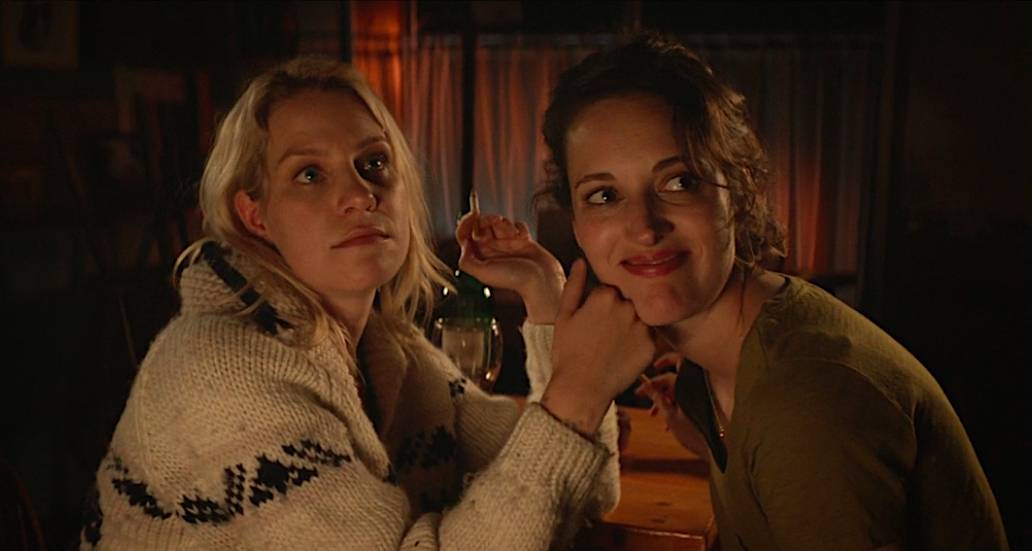
In Season 1, Fleabag is not coping particularly well. She surrounds herself with things that remind her of Boo and she cannot stop thinking about her—both the good memories and the bad. She is haunted by Boo because she feels responsible for her death. Fleabag keeps the café—which she started together with Boo—exactly as it was when Boo died: guinea-pig-themed, in honor of Hillary (who Fleabag gave to Boo as a gift). Boo was so in love with Hillary that the entire café became a shrine to her. After Boo’s death, Fleabag keeps it this way as a shrine to Boo.
The café is struggling financially, though Fleabag spends Season 1 hiding the extent of her money troubles from her father, his girlfriend (who also happens to be her godmother), and her sister, Claire. Eventually, Claire finds out but Fleabag can’t bring herself to ask her sister for help (even though she’s got the money and then some). The sisters simply don’t have that kind of relationship. At one point, Godmother tells Fleabag it might be time to give up on the café but she can’t; it’s the last piece of Boo that she has left. In flashback, we see Boo and Fleabag in the café, and Boo tells her, “We did this. And whatever happens, we never let it go.” Even if, financially speaking, it may be the best decision to cut her losses, Fleabag simply cannot let go of the café because it would be the equivalent of letting go of Boo.
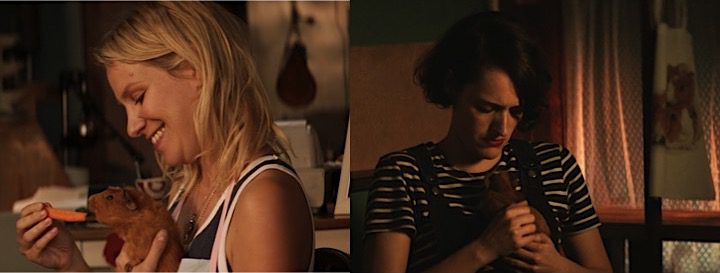
To let go of Boo would be to forgive herself for what she’s done, and she absolutely can’t and won’t do that. The Boo betrayal is Fleabag’s Original Sin. Everyone has that one thing they’ve done that they will never and can never forgive themselves for. We will always regret it; we will never forget it. We can’t, because it’s a sin so deep it becomes a part of who we are. The concept of Original Sin applies to all of us; it’s just not there from birth. We are all born pure but our inevitable sin lays in wait. When and where it occurs is entirely up to us.
The way Fleabag uses sex in Season 1 is a result of the guilt and shame she feels surrounding Boo’s death and the role she played in it. Lust was the sin that started it all and so she has a very skewed perception of sex: what it is, what it isn’t, and what it should be. Fleabag tells us, “I’m not obsessed with sex, I just can’t stop thinking about it. The performance of it. The awkwardness of it. The drama of it. The moment you realize someone wants your body. Not so much the feeling of it.” It is worth noting that nowhere in her description of sex is there even a hint of emotional connection. Sex is an act of the body and the mind’s only role is to choreograph the performance. Even the feeling of pleasure sex may bring isn’t essential to her obsession with it. While her statement about sex is honest and parts of it ring true, it is emotionally hollow.
This is one of the things that Phoebe Waller-Bridge does so incredibly well in Fleabag: she writes something like this, which is on some level incredibly relatable, but it is also so specific to Fleabag’s personal experience. Waller-Bridge is able to tap into some of the most basic and universal aspects of female sexuality—the often performative nature of sex, the disconnect between body and mind that can occur with no-strings-attached relationships, the tightrope that sex-positive women walk between sexual liberation and shame—but it never comes across as anything but Fleabag speaking her own truth. Certainly Fleabag’s personal life experiences are not universal, but there is something so completely true-to-life about the way she experiences the world.
In between breakups with her on-again-off-again boyfriend Harry, Fleabag thinks she wants casual sex. And she does want it; she even enjoys it—until she doesn’t. She has a “Harry Panic” while having sex with Arsehole Guy and ends up calling Harry afterward in an attempt to reconcile (as she has done many times before). Harry is safe; Harry is the guy you settle for and settle down with, churn out a few babies, and go about your life as a “proper adult.” But Fleabag doesn’t want those things, especially not with Harry who, while excellent on paper, does not even remotely satisfy her emotionally or physically.
Fleabag tells us exactly how she feels about sex with Harry: “I wish he’d just fuck me. All he wants to do is make love. He’s wasting me.” For a woman like Fleabag, who truly does enjoy the pleasures of her own body and the raw carnality of sex with others, it would be an absolute nightmare to be in a monogamous relationship with someone who is incapable of satisfying her sexually. Making love is all well and good, but it’s like vanilla ice cream: it’s delicious, and sometimes it’s exactly what you want, but other times you want some hot fudge and sprinkles with it. Maybe you want to try different flavors to mix it up. Maybe you even want an entirely different type of dessert. Can you imagine a life where the only thing on the menu is vanilla ice cream? No thank you.
Fleabag keeps going back to Harry time and time again because, despite the fact that he bores her (in and out of the sack), he is reliable. She always knows what she is getting with Harry, even if it’s not even remotely what she wants. This is, of course, incredibly unfair to Harry. It’s selfish of Fleabag to do this, and she knows it. You can say a lot of things about Fleabag, but at least she is self-aware—painfully so, even. Yet that doesn’t stop her from doing bad things. She may not always know why she does the bad things, but she knows they are bad when she’s doing them. She just can’t stop herself and more often than not it ends poorly for her (and for others).
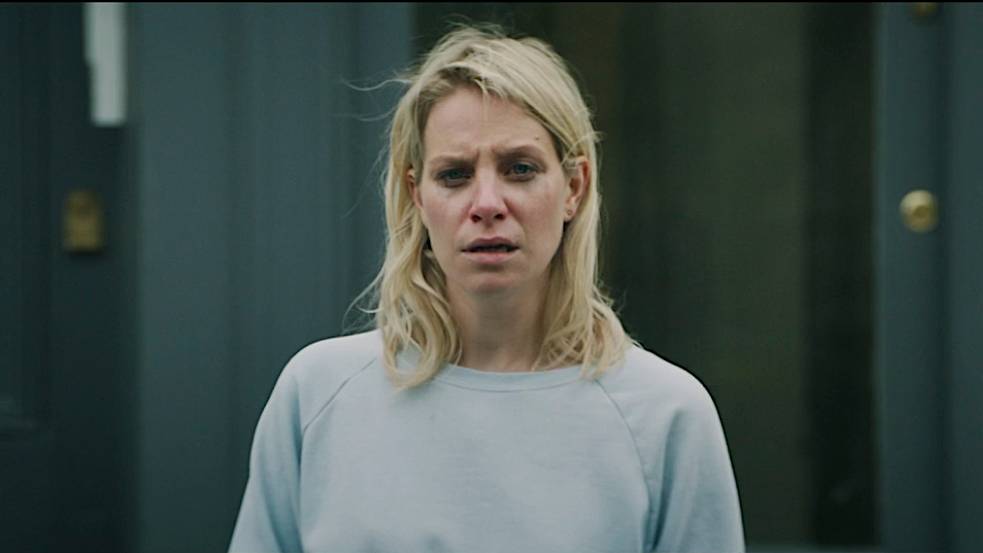
But just because Fleabag does bad things, it doesn’t make her a bad person. We are, all of us, full of sin. Some of us more than others, and some sins worse than others, but who among us is perfect? To apply the concept of Original Sin would be a bit too dogmatic for my taste but I do believe that all people, while not inherently sinful, are capable of committing sins and have done so on more than one occasion. What is important is what we do with ourselves once we’ve sinned because, as Boo believes so deeply, “People make mistakes.”
Fleabag decided that she was beyond salvation after her sin against Boo. She continued to make bad choices, fully cognizant of the fact she was doing so, because why not? She was already damned. The worst had already happened. So why not just do whatever makes her happy in the moment and deal with the consequences later (or, better yet, repress them and not deal with them at all)? So she bottles most of it up, self-medicates with sex, and carries on.
Of course, this is not a healthy or sustainable coping mechanism given what she’s gone through. What it’s doing, essentially, is skewing her perspective on sex and relationships and damaging her sense of self. In this respect, Godmother is the perfect foil for Fleabag. Godmother is in a happy, sexually satisfying relationship with Fleabag’s father; she expresses her sexuality fully through her art; she has no hang-ups or guilt or shame about any of it. In fact, she is holding a “Sexhibition” to showcase it all —but being the absolute bitch that she is—she can’t help but use Fleabag and Claire’s memorial luncheon for their dead mother to announce the event.
Godmother’s art would be considered profane by many people’s standard, but she is a woman who is completely comfortable with her own sexuality and sexuality in general. She is a bit too comfortable for Fleabag and Claire’s tastes as she has zero inhibitions when it comes to describing their father’s sexual prowess. Godmother describes her Sexhibition as “a journey through my physical and sexual life, climaxing in a few pieces inspired by and moulded on your father.” While Godmother herself is an absolute nightmare (though Olivia Coleman’s performance is consistently a delight), her work—while it may not be everyone’s cup of tea—actually has a very interesting and important message.
Godmother’s goal is not to shock people but to encourage them to be more comfortable with sexuality and with the female body—specifically her body, which she has photographed in the nude every year for the past 30 years. When questioned about the point of this, she says, “I think it’s important for women of all ages to see how my body has changed over the years. I think they have to have a healthy perspective on my body.” This concept is actually fascinating and, if Fleabag could look past how much she despises Godmother, I think she might actually appreciate it.

Godmother’s opening speech at the Sexhibition explains quite clearly its purpose: “This Sexhibition isn’t about me trying to get you all aroused. It’s about the beauty of sex, and how it brings us all together. How it excites and connects, how it opens people’s minds. After all, sex got us all here. Sex brings life.” Of course, as Fleabag listens to this, she can’t help but be reminded that this is not always the case; in her case, sex brought death.
In addition to every other thing she hates about her, I think Fleabag can’t help but be jealous of Godmother’s ability to view sex and sexuality as a fully positive experience. For Godmother, sex is both something intimate and enjoyable but also something that transcends the physical. She tells her audience, “I don’t believe people always think about sex when they see a naked body. I believe they think about their own minds, their own bodies, and their own power.” To speak of sex or create art based around it is not something to be ashamed of; it is something to be celebrated. It finds beauty in the profane. Godmother feels no guilt or shame surrounding her body or her sexuality, which is an attitude that Fleabag would do well to embrace.
But she can’t. At this point, her feelings around sex are all twisted up in her betrayal of Boo. How could it possibly become a thing of beauty—an act of the mind as well as the body—when her mind is filled with thoughts of the worst thing she’s ever done? In order to have sex, which she is by her own admission obsessed with, Fleabag has to turn off the part of her mind where emotions live. She has to divorce the physical from the emotional. She has to focus solely on the carnal desire aspect of things because, as soon as emotion or thoughts creep in, she can’t enjoy sex because it becomes emblematic of her sin.
By the end of Season 1, Fleabag has no one in her life. Arsehole Guy, who she believed was falling in love with her, was actually just cheating on his girlfriend. Harry is happy in a new relationship and headed towards marriage. But the worst and deepest cut comes from Claire. Claire’s husband Martin—who is a lecherous alcoholic piece of trash—had tried to kiss Fleabag at Claire’s birthday party. As lonely as she may have been, Fleabag would never accept Martin’s sexual advances and she pushed him away. Not only is she not even remotely attracted to Martin, she would never ever betray her sister like that. It is simply a bridge too far. I don’t even think that her guilt about Boo had a thing to do with it. She just simply would never do that.
While Claire initially believed Fleabag, somehow Martin convinced her to believe that things were the other way around. Even worse, Claire uses the Boo betrayal as evidence that Fleabag is capable of doing something so incredibly low. While Fleabag knows the truth of what happened, she really can’t argue with Claire’s logic. Being forced by her own sister—who is likely the only one she trusted with the full story—to think about what she did to Boo sends Fleabag into a shame spiral that puts her at the exact spot where Boo stepped into the road and died.
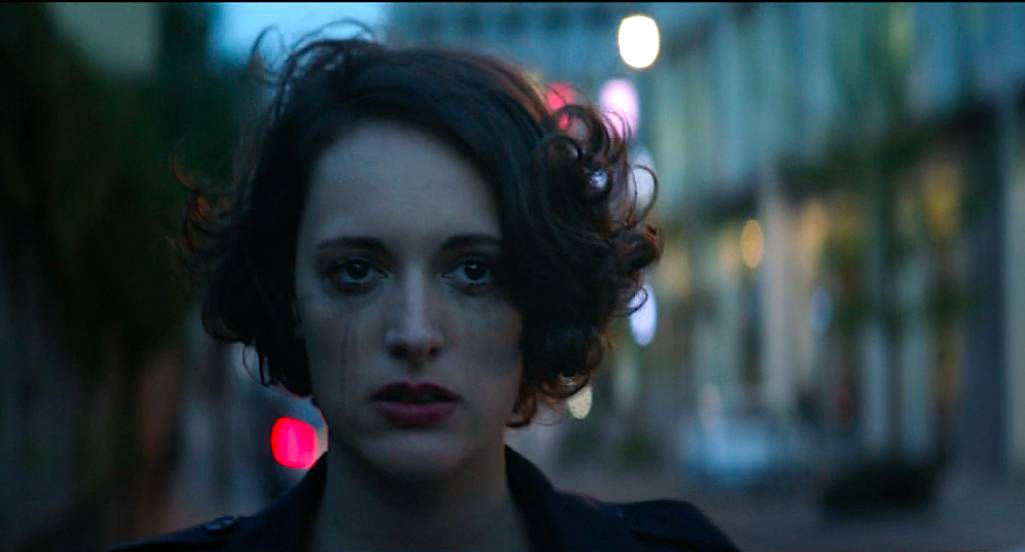
Perhaps Fleabag would have followed in Boo’s footsteps if Bank Manager hadn’t happened along at the exact right moment. At this point, she is completely broken and she opens up to him about how she really feels about sex:
I fucked my friend by fucking her boyfriend. And sometimes I wish I didn’t even know that fucking existed. And I know that my body, as it is now, really is the only thing I have left, and when that gets old and unfuckable I may as well just kill it. And somehow there isn’t anything worse than someone who doesn’t want to fuck me. I fuck everything…Either everyone feels like this a little bit, and they’re just not talking about it, or I’m completely fucking alone.
She has finally reached the point of true self-awareness here. Only after hitting rock bottom, having nothing and no one left in her life, is she able to say it all out loud. She chooses Bank Manager basically because he’s there, but also because he was equally as vulnerable and truthful with her when they happened to meet up at the retreat weekend. They are basically strangers and yet they know each other’s truths. And so Bank Manager tries to help Fleabag get back on her feet with the café, and by Season 2, we see that it’s worked. Not only is the café thriving, Fleabag is actively staying away from sex and relationships while she lets her psyche heal.
Everything is going well. It really is. It actually is. And then she meets The Priest.
We are introduced to The Priest at the engagement dinner for Fleabag’s father and Godmother. It becomes clear right away that he isn’t your traditional Catholic clergyman; he’s a “cool, sweary priest,” and Fleabag is intrigued by him. He is the only one at the table (which includes the happy couple, as well as Claire and Martin) who asks her anything about herself. As one might expect when Fleabag’s family is involved, the evening goes south fairly quickly. After Claire discovers she is having a miscarriage in the restaurant bathroom (but refuses to acknowledge it openly or go to the hospital), Fleabag tells the table that she was the one having the miscarriage. Martin (who is secretly still drinking while claiming to be sober) is predictably callous about it. Not knowing that it is actually Claire’s miscarriage, he takes the medical emergency as an opportunity to insult Fleabag:
That’s probably for the best. You know, it’s like a goldfish out the bowl, sort of thing. If it didn’t want to be in there, it didn’t want to be in there. Something wasn’t right. It’s the kid’s choice if it wants to jump ship, right? Either way, she got her spotlight.
So of course, Fleabag ends up punching Martin in the face (and rightfully so), and when he punches her back, she ends up head-butting The Priest in the eye. All in all, pretty par for the course as far as a Fleabag family dinner goes, but there is a silver lining to this particular cloud: Claire and Fleabag finally start back on the road to reconciliation as she allows Fleabag to take her to the hospital. Then, of course, there is The Priest, who is concerned for Fleabag (but not in an overbearing priestly “save your soul” sort of way) and gives her his number. Even Claire has to admit, “the priest is quite hot.”
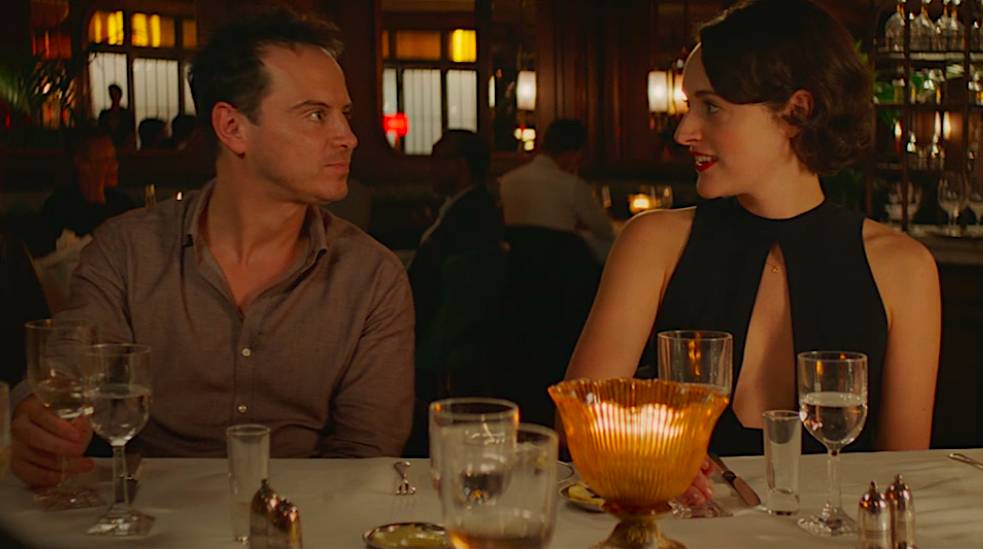
As Season 2 progresses, Fleabag and The Priest engage in a flirtation that is destined to end in sex. She starts attending church service (and it’s a pretty safe bet that the last time Fleabag was in a church was her mother’s funeral service); she volunteers at church-sponsored events; she has afternoon Gin-and-Tonics in a can with The Priest in his office. In her very first session, Fleabag admits to her therapist that she wants to have sex with him even though she has been trying out the whole abstinence thing (and it’s been working for her). She tells the therapist, “I spent most of my adult life using sex to deflect from the screaming void inside my empty heart,” and we know how painfully true that is.
Fleabag has finally reached the point where she understands herself and why she did the things she did, and she’s actively trying to stop it. But the fact remains: she wants to fuck The Priest. When she admits this, her therapist poses a fascinating question: “Do you want to fuck a priest or do you want to fuck God?” The therapist wonders whether her desire for the priest is just her desire to wield power, in this case the power to corrupt a man of the cloth.
Fleabag is fascinated by the idea of having sex with a priest; that sort of sinful behavior is right up her alley. We, the audience, are not even remotely surprised that she fancies him and, honestly, it’s hard to blame her. He may claim otherwise but The Priest encourages her at almost every turn. His feelings are more complicated, both because we are not privy to the inner workings of his mind as we are with Fleabag, and because he is conflicted himself. He doesn’t know what he wants. Well…he does, but what he wants is something that will completely ruin his life.
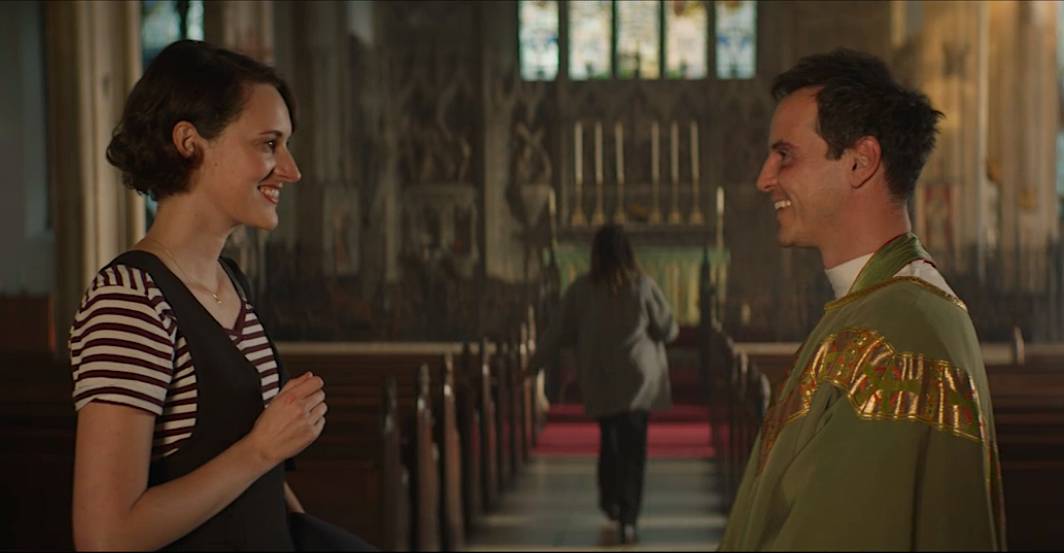
After a particularly disastrous evening helping Claire with a work event, Fleabag goes to see the priest—G&Ts in hand—and they have a discussion about his calling. He tells her that he is meant to love differently, “as a father to many.” When she inquires about the whole celibacy thing, he tells her that it is far easier to be celibate than to deal with romantic relationships. He continues to flirt with her but makes it clear in no uncertain terms: “We’re not going to have sex. I know that’s what you think you want from me, but it’s not. It won’t bring any good.” But really, I think he’s trying to convince himself of this more than he is trying to convince her.
Before they can get any further into this conversation, something amazing happens: he sees her break the fourth wall. Though he can’t hear her speaking, he can see that she’s gone somewhere else. It’s as if he can sense that she is confessing to us, he just can’t hear her confession. This is, I think, the most brilliant twist that Phoebe Waller-Bridge accomplishes in all of Fleabag. Turning the fourth-wall trope on its head by allowing The Priest to sense it, to be the only person in Fleabag’s entire life who could sense it, is such an interesting way to draw the two of them closer together. It provides a level of intimacy in their relationship far deeper than any sex they could have.
But, of course, they do have sex—but not before Fleabag makes an attempt at just being friends. It doesn’t last long, though, because she becomes incredibly closed off as The Priest tries to get to know her. She refuses to answer questions about herself and ends up pushing him away. This is clearly a defense mechanism because she knows that getting close to him will only deepen the feelings and attraction she has for him. She’s attempting to respect his boundaries but she’s simply incapable of just being friends.
After her spat with The Priest, she spends the day thinking about her mother’s funeral and recalls a conversation she had with Boo afterward:
Fleabag: I don’t know what to do with it.
Boo: With what?
Fleabag: With all the love I have for her. I don’t know where to put it now.
Boo: I’ll take it…No, I’m serious. It sounds lovely. I’ll have it. You have to give it to me…It’s got to go somewhere.
With Boo gone now, Fleabag hasn’t found a new place to put all her love. She ends up at the church that night, but she’s not there for G&T’s and flirting; she’s actually there to pray. She’s interrupted by loud music and finds The Priest, who is clearly inebriated. She’s truly not there for any sort of lascivious purpose, but he doesn’t really give her half a chance to stay strong. When she calls him Father, he responds, “Fuck you calling me ‘Father’ like it doesn’t turn you on just to say it,” and then asks her if she’d like a drink. The Priest knows that Fleabag has fallen for him and, drunk or not, it’s incredibly unfair of him to toy with that particular emotion. He’s not doing it on purpose, but he should know better. He should know better than to do a lot of the things he does this particular night, but perhaps he is just as much of a “weaky” as she is when it comes to willpower.
She ends up in his confessional, completely vulnerable and speaking her truth to him. She is speaking as a penitent, and he should be listening as a priest, but he isn’t. Initially, I think he believes that she won’t take it seriously—and, to be fair, it would be completely in character for her to make a big joke out of it. He thinks she’s just going to cheekily catalog her many, many sins (and he really wants to hear them). But this particular night, with thoughts of Boo and her mother floating around in her head, Fleabag is completely raw. She tells him her deepest fear is of forgetting people and that she just desperately wants someone in her life to tell her what to do.
I just think I want someone to tell me how to live my life, Father, because so far I think I’ve been getting it wrong. And I know that’s why people want people like you in their lives. Because you just tell them how to do it. You just tell them what to do, and what they’ll get out of the end of it. Even though I don’t believe your bullshit, and I know that scientifically nothing I do makes any difference in the end anyway, I’m still scared. Why am I still scared? So just tell me what to do.
And what does he do? He tells her to kneel, sweeps open the curtain, and kisses her.
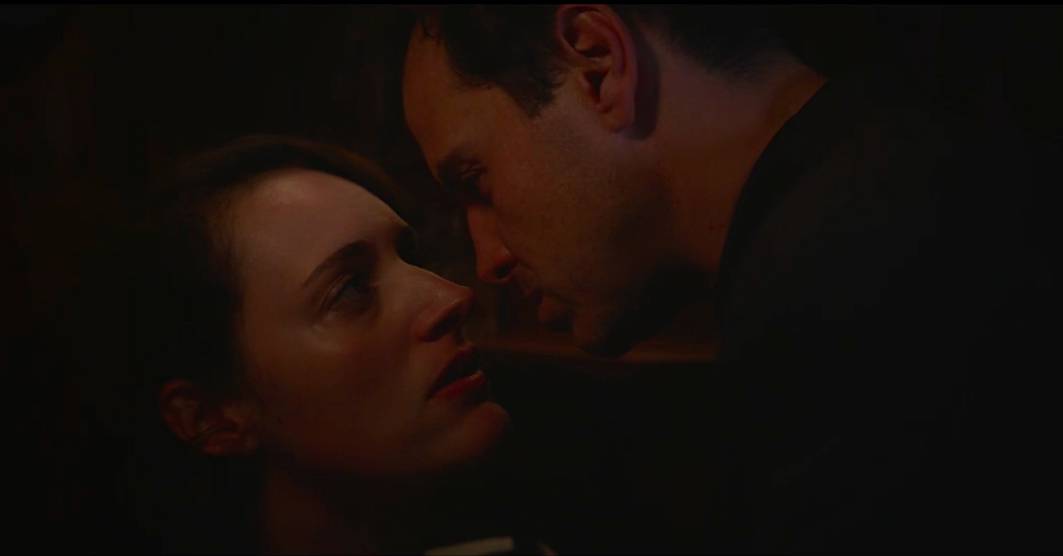
It’s something straight out of a steamy piece of fan-fiction and it’s a delight to watch after all the will they/won’t they build-up throughout Season 2. But why is it enjoyable? Because, quite simply, it’s about as profane as it gets: Hot Priest and Naughty Penitent. It’s something Fleabag would search for on Pornhub, but it’s her actual life. We want her to be happy; we know she’s in love with him, and so we celebrate it in that moment. But it’s fleeting because, as a painting comes crashing down off the wall, The Priest takes it as a sign from God that he’s sinning (not that he should really need a sign to know that) and he breaks away from her and leaves.
The Priest can’t quit her, though. He tries to make a clean break, lying to Godmother and Fleabag’s father that he can’t officiate the wedding because his brother was in an accident, and telling Fleabag, “Please don’t come to the church again. I mean that with the greatest of compliments.” For The Priest, his sins with Fleabag in the confessional have turned the church—something so sacred to him—into something profane: a reminder of his brief yet undeniable fall from grace. But the fact remains: he does love her, and love is a beautiful thing.
There always is something so tragic about a love that is doomed from the start, especially one as incredibly taboo as Fleabag and The Priest. And yet we can’t help but hope that it works out even though we know it can’t possibly. Even Claire, when she finds out (after a fit of laughter) has to admit that her sister is her hero for going for something like that. For the straight-laced Claire, trapped in a loveless marriage with a horrible man, Fleabag’s willingness to follow her heart—even to the most toxic of places—would be admirable, even inspirational. Eventually, it is Fleabag who gives Claire the courage to leave Martin and pursue a relationship with her Finland partner, Klare: a man she actually loves.
But, as Fleabag tells her, it’s incredibly painful. There is nothing so hurtful as loving someone (and being loved by someone) when it simply cannot work out. Which is why, when The Priest shows up at Fleabag’s house, desperately trying to convince himself they aren’t going to have sex (even though they very clearly are), it’s so much more poignant than if they had just done it in the church that night. He’s struggling with his feelings for her, which threaten to jeopardize all the sacrifices he has made to get where he is. He tells her, “I can’t have sex with you, because I’ll fall in love with you. And if I fall in love with you, I won’t burst into flames, but my life will be fucked.”
But all of that is just words because they both know what they want and what they are going to do. When it finally happens, it’s a beautiful thing, not because it’s wrong but because it is right: two people in love, making love. Because it is making love; it’s not just fucking with The Priest, and what makes it even more special is Phoebe Waller-Bridge’s choice to have Fleabag break the fourth wall during the act to push the camera away. Fleabag has always allowed us to see her, but sex with The Priest is sacred to her; it’s just for the two of them, and it’s the only thing she refuses to share.
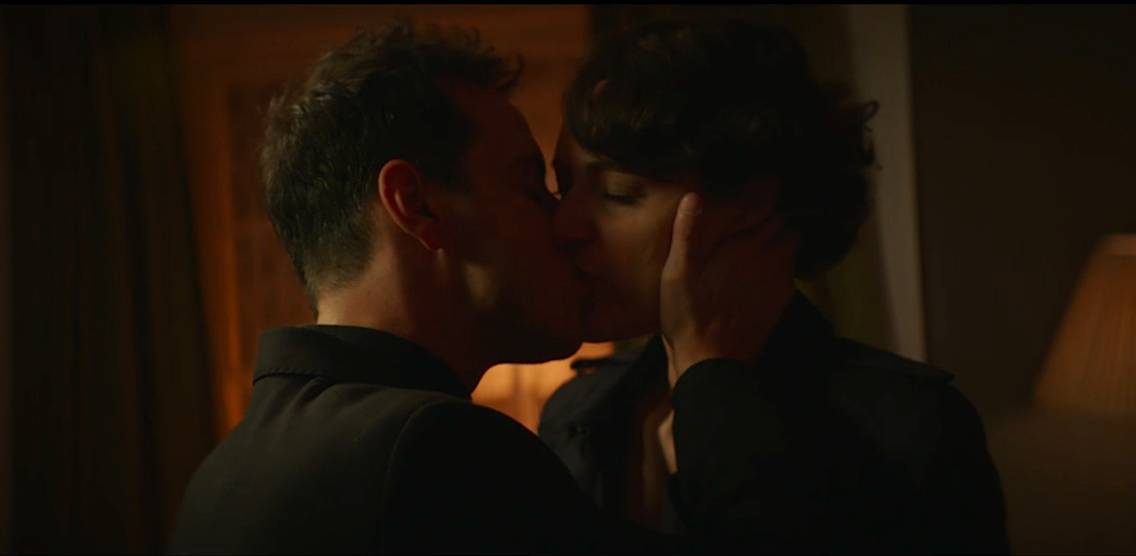
They are equally enamored of one another, but while Fleabag knows for certain where her feelings come from, The Priest is conflicted. When they can’t keep their hands off each other before the wedding, The Priest says, “I don’t know what this feeling is.” Fleabag asks, “Is it God or is it me?” and he doesn’t know the answer to that question. This is an interesting concept: the idea that his romantic and sexual feelings for Fleabag could, in fact, be God. It seems antithetical, but it makes a horrible sort of sense. In The Priest’s mind Fleabag would in some way be a test from God—a challenge to either pass or fail—and whatever happiness or pleasure he is feeling would be a crucial part of that test; he would be feeling God.
I have to wonder, had she not posed that specific question, if things would have ended differently for them. I tend to think that it would have ended up the same, but I think her question is what sets him on the path to his ultimate decision. The speech he gives at the wedding is very directly tied to his own experience with Fleabag; it is a speech meant for her and a speech about her:
Love is awful. It’s awful. It’s painful. It’s frightening. Makes you doubt yourself, judge yourself. Distance yourself from the other people in your life. Makes you selfish. Makes you creepy. Makes you obsessed with your hair. Makes you cruel. Makes you say and do things you never thought you would do. It’s all any of us want and it’s hell when we get there. So, no wonder it’s something we don’t want to do on our own. I was taught if we’re born with love, then life is about choosing the right place to put it. People talk about that a lot: it “feeling right…When it feels right it’s easy.” But I’m not sure that’s true. It takes strength to know what’s right. And love isn’t something that weak people do. Being a romantic takes a hell of a lot of hope. I think what they mean is, when you find somebody that you love, it feels like hope.
While this is a lovely speech in its own way, it’s really the death knell for their relationship, because while she wants to believe he is speaking about her, he has decided that it is, in fact, God he loves and not her. Well, he does love her; he just loves God more.
Fleabag’s father understands her better than I think any of us, including Fleabag, knew. He sees all her flaws (and frequently points them out to her) but in the end, we see that he also sees the very best parts of her—the ones she so often hides from the world. As he is hiding away in the attic with cold feet before the wedding, he tells her, “I think you know how to love better than any of us. That’s why you find it all so painful.” While she denies to us that she does find it painful, we all know she is lying. Love and relationships have never brought her anything but pain and, unfortunately, The Priest is no exception.
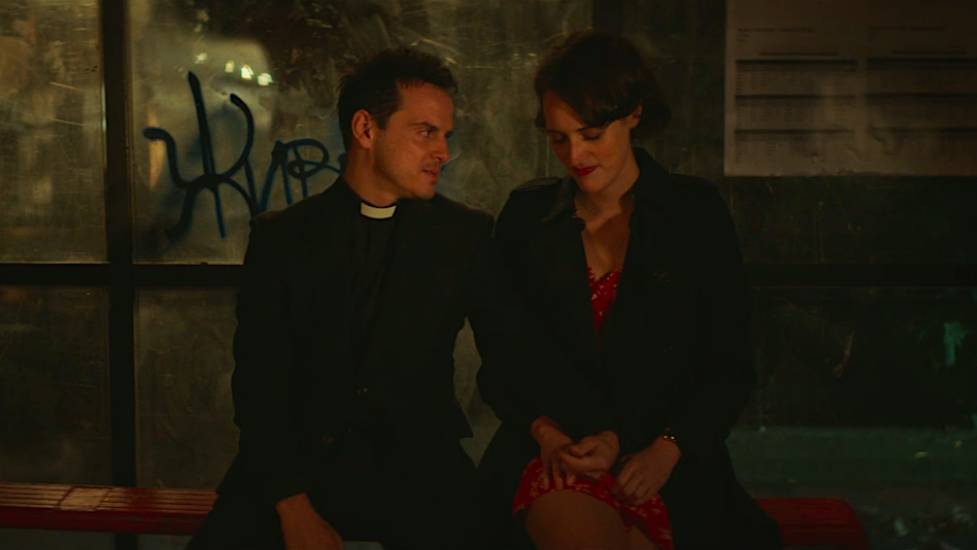
In their final moments together, Fleabag tells The Priest that she loves him and he replies, “It’ll pass.” While he does admit to her that he loves her as he takes his leave, it doesn’t really matter. She knows that it’s over, that there is no getting him to run back to her time and again as she was able to do with Harry. And she doesn’t want to, because at the end of Fleabag we can see that, while she is in pain, she still has the hope that loving someone can bring. She is not going to allow the end of their brief, doomed relationship kill that hope for her.
In the show’s final moments, Fleabag shakes her head at us and then walks away, turning back to wave goodbye to us. Waller-Bridge has confirmed that Fleabag’s second season is it’s last; this is the end of Fleabag’s story—at least, the end for us. While I would obviously love more, I think it’s a really lovely way to end the show. The season opened with Fleabag telling us, “This is a love story,” and it was (albeit a tragic one). But there is hope at the end, and that’s a beautiful thing. Fleabag leaves us with the feeling that it will all be okay in the end. As painful as lost love can be, as long as you can keep hope alive, the pain will pass.


Wow. What an amazing write up. Your talent is inspiring.
I’m a bit late, but after obsessing over the show and reading many, many reviews and summaries, this is by far my favorite one. Spot on indeed!
Beautifully written how all the tits and bits were connected, pained again how the story did end, But as long as there is hope!
Just finished watching Fleabag the second time. This is such a thoughtful writeup. Thank you.
”Nothing wrong when a song ends in a minor key” (Fiona Apple, Werewolf)
I haven’t been able to watch it, so I decided to read this instead & I’m crying as I’ve finished. It was written so lovely, I was sad to say goodbye to her. Thank you